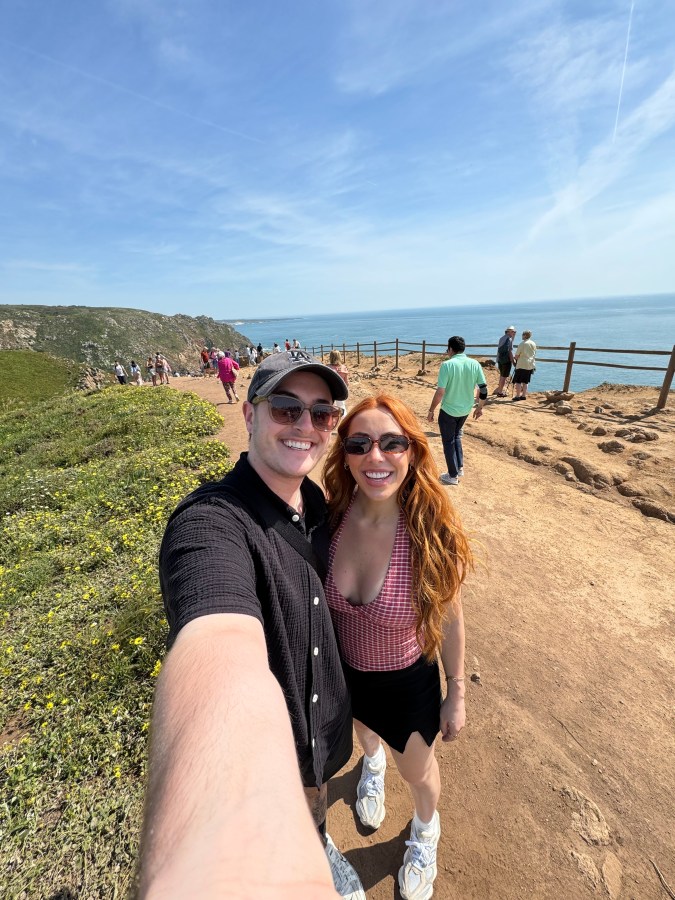This is The Parlour, a new weekly micro-essay series at Autostraddle for unfiltered, of-the-moment queer slice-of-life writing. We launched The Parlour initially as a newsletter and paywalled series, but we’re pivoting! The Parlour will no longer be a newsletter but rather a hybrid series on-site that is sometimes paywalled for our members, sometimes available to everyone (like this one! you can all read it!). The editors conceived of The Parlour as being an interesting way to archive current queer life on a super micro level. The writer for The Parlour rotates weekly, so you’re getting a bevy of queer and trans perspectives Wednesday to Wednesday. The purpose of these micro essays is to write in the moment, to ask questions without the pressure to answer them, to hopefully start a conversation and welcome you into our shared queer diary.
“Lisbon would make a fantastic apocalypse city,” I said to my girlfriend as we struggled up and down the city’s cobblestone streets. It reminded me of maps I’d seen in video games or zombie movies – lots of balconettes and varied rooftop heights perfect for fleeing or chasing. It was our second evening in town, and we were making our way to the queer street, Rua da Rosa, for dinner and drinks. We ate at a restaurant called Leonetta and both decided it would make a beautiful name for a daughter.
It was that same day we learned my girlfriend had accidentally set me up to misgender myself for the first 48 hours by telling me “thank you” in Portuguese is gendered based on the person you’re saying it to. So, to her understanding, you’d say “obrigado” when thanking a man and “obrigada” when thanking a woman. But what language actually works like that? None. The translation is actually gendered based on the person doing the thanking. So each time I proudly said “obrigada” to folks at the airport, taxi drivers, neighbors, shop workers, and everyone else we interacted with in our first two days, I was outing myself. Oops.
Unbeknownst to me, the next day I would catch a glimpse of what Lisbon might look like during an apocalypse. My girlfriend and I were on a private tour of neighboring cities, Sintra and Cascais, with our incredibly kind tour guide Tiago when the entire Iberian Peninsula’s grid went down. More specifically, we were in a castle on the top of a mountain.
First, it was the cell service. Texts weren’t sending, but that was to be expected in such a location. Next, the castle staff’s electronic system went down, making them unable to track the number of people on the grounds. We finally learned this was a large-scale issue when Tiago received a call from his mother, who he lived with, alerting him that Portugal, Spain, and part of France’s grids were down.
“Please take care of the cheesecake in the refrigerator?” he asked his mom. “It’s homemade,” he explained to us in the back of the Sprinter van.


Slowly but surely, each of our planned tours for the rest of the day was canceled for safety reasons. We were about 45 minutes away from central Lisbon, where we were staying, and none of the traffic lights were working. We had a decision to make: go back to Tiago’s house and eat cheesecake with him and his mom or try to make our way back to Lisbon. Tiago felt confident he could get us back to the city.
The electricity was, indeed, out in the apartment where we were staying. We were so tired from the nearly 20,000 steps we took earlier and took a shared nap on the living room couch. When we awoke, the power was still off. No problem, there appeared to be plenty of people in our neighborhood dining outside… surely restaurants have generators. Wrong. Everyone was in full March 2020 mode, erecting makeshift accommodations for hungry, panicked people and slightly breaking capacity and health code rules without clear instruction from the government on what to do. It oddly felt nostalgic and comforting, if not also absolutely terrifying.
“Does Portugal have any enemies?” I thought to myself. And eventually, aloud.
“I don’t think so,” my girlfriend replied.
This is how an apocalypse movie usually starts, to be fair. The grid goes down, governments fail to prepare their citizens for disaster, they freak out and take sides, and war begins without anyone ever having to deploy a weapon.
The emergency radio said restoring the grid could take anywhere between eight hours and three days. We were sure people would be looting the main strip of designer stores close to where we were staying within the first hour.
“Oh right, that would only happen in America,” my girlfriend and I remembered, grateful to be in Europe.
We made our way to a Sofitel on the main strip and stole their Wi-Fi out on the sidewalk. We were turned away from their restaurant since we weren’t staying there.
“We’ll pay! We have money!” we begged. The only problem was, we didn’t. We only had 40 euros between us, and all of the ATMs were out of service during the blackout. So there we were, in a foreign country with no cell service, no electricity, barely any cash, and all I knew how to say in the local language was “Thanks, I am a woman.”


Despite it all, I felt pretty calm. Maybe it was because I had already scoped out the best hideaway spots on our walks throughout the city, or because I had already experienced a widespread public disaster, or because I was with the love of my life… but I knew everything was going to be okay. After getting turned away from about 22 restaurants, in what my girlfriend described as a real “no room at the inn” situation, we found a small, local restaurant to eat at and be amongst people. After the server told us which items were still available to order, my girlfriend and I did some quick math to see how long we could make our 40 euros last and decided on our dinner order: a basket of bread with butter.
After an hour and forty minutes, the basket of bread and butter made it to our table. By then, the sun had begun to set, and the grid being down went from something that meant we couldn’t look at Instagram to something that meant we wouldn’t be able to find our way back to the apartment easily. Admittedly, we were scared! We started to discuss game plans in case our train in the morning would be canceled, how to get in touch with our parents back in the States, and how we’d eat the next day. We were trying to be practical but also, we’re two comedians, so we had as much fun as we could between logistical discussions. We people-watched, theorized what kind of cheesecake-filled life Tiago lived, and shared stories we somehow hadn’t told each other when, all of a sudden, a few street lights down the block lit up. And with the lights came cheers of locals and visitors alike in that small alleyway.
It was like people out on their fire escapes banging pots and pans together for medical professionals in 2020 — so happy and excited and relieved that they couldn’t help but shout about it.
All in all, the blackout lasted, for us, about ten hours. So, not quite apocalyptic status, but close enough. I maintain my original stance: Lisbon would make a fantastic apocalyptic city. But I think what I really learned is that my girlfriend makes a fantastic apocalyptic buddy.



I love this series! Quick snapshots that take me out of my own reality for a moment and let me step into someone else’s. Glad you and your girlfriend were safe!
yes! exactly how we want this series to feel <3 thanks for the love!
Thank you for reading!!!
I wouldn’t worry too much about origada/o. People probably assumed you were just starting the language and making an easy mistake.
We do know that Lisbon would make an amazing apocalypse city, because it already happened. A powerful earthquake and tsunami hit Lisbon, followed by a massive firestorm, as it was All Soul’s Day, and everyone was in church, lighting candles. The existing city was flattened, and rebuilt as “Enlightenment on a budget”, as Rick Steves says.
Haha totally, I’m not worried about it, just made me laugh so much. And yes! We learned all about All Soul’s Day on our tour (the day the outage happened). I didn’t have any visuals for it, but our guide had really fun stories about that day that have tricked down generations.
Non native speakers always struggle with tenses and genders in portuguese, doubtful anyone thought much of it.
Male form is universal both genders can use it.